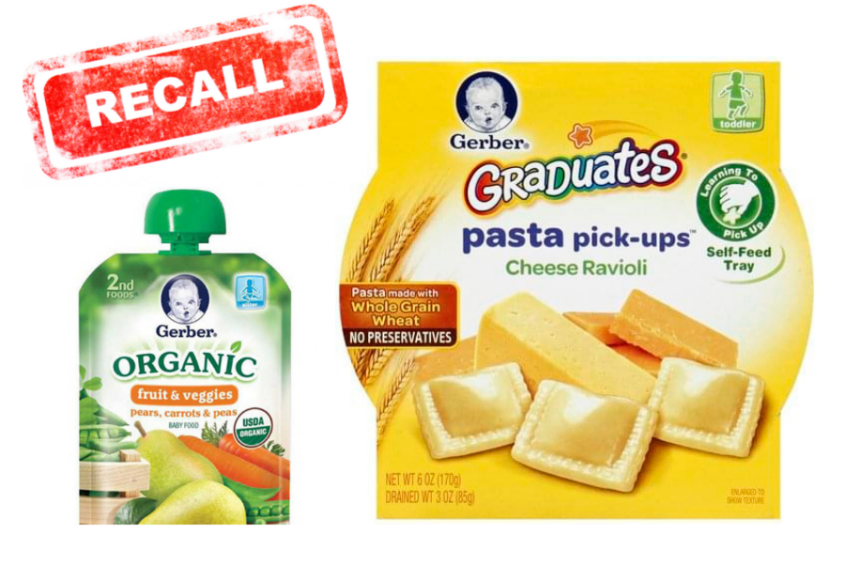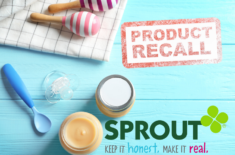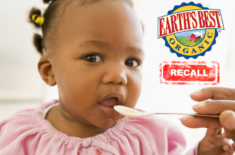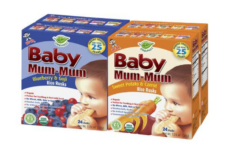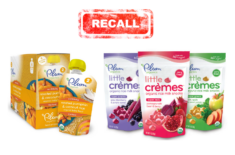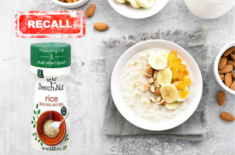Overview
Did you know that exposure to toxic heavy metals can significantly affect your baby’s brain development? It could lead to a decrease in IQ and possible antisocial behavior in young children. (1)(2)
What’s alarming is that as much as 95% of baby food products from some of the most popular brands in the U.S. contain significant levels of mercury, lead, arsenic, and cadmium. (3)
In tests commissioned by HBBF (Healthy Babies Bright Futures), toxic heavy metals were found in 95% of the 168 commercial baby foods tested. Many were at dangerous levels, higher than the limits set by the FDA (U.S. Food and Drug Administration). (3)
Last February 2021, the Subcommittee on Economic and Consumer Policy of the U.S. Congress released a detailed Congressional Report on toxic products prepared by seven popular baby food companies. (4)
What were the Subcommittee’s findings, and how did the companies respond? Which products contained high levels of toxic heavy metals?
Gerber Products Company was among the baby food manufacturers listed in the report. Over the years, Gerber had issued some baby food recalls (and also Gerber formula recalls). But did the new report lead to a recall of the affected Gerber baby foods?
In January 2023, in response to public clamor, the FDA announced that they’re proposing limits on lead in baby food. They’re also creating a new food safety unit.
Thankfully, as of May 2024, Gerber hasn’t issued any baby food recalls for the year.
Continue reading to learn more.
Subcommittee Congressional Report On Foods Known To Have Contained High Levels of Heavy Metals
What Baby Food Has Toxic Metals?
The Subcommittee asked the following baby food manufacturers to submit test results of the products that reportedly have high levels of toxic heavy metals: (4)
- Nurture, Inc. (HappyBABY and HappyTOT)
- Beech-Nut Nutrition Company (Beech-Nut)
- Hain Celestial Group, Inc. (Earth’s Best Organic)
- Gerber Products Company
- Campbell Soup Company (Plum Organics)
- Walmart Inc. (Parent’s Choice)
- Sprout Foods, Inc. (Sprout Organic Foods)
Of these seven companies, only Gerber, Nurture, Hain, and Beech-Nut submitted their test results and internal standards or testing policies to the Subcommittee. (4)
Walmart, Sprout, and Campbell refused to cooperate, according to the Congressional Report. (4)
However, despite complying with the request, the four companies alarmed the Subcommittee over test results that showed heavy metal levels were several times the FDA’s maximum allowable levels. (4)
FDA maximum limits in ppb or parts per billion for infant rice cereal: (5)
- 100 ppb inorganic arsenic
FDA maximum limits in ppb for bottled water:
- 5 ppb cadmium
- 5 ppb lead
- 10 ppb inorganic arsenic
EPA (Environmental Protection Agency) maximum limit in ppb for drinking water (also applies to food):
- 2 ppb mercury
The Subcommittee was alarmed that the companies didn’t correct the heavy metal levels in their raw materials and finished products. Instead, these baby food companies created internal standards with increased limits. (4)
According to their new reports, these companies’ finished products passed because they have higher limits for their internal standards. Yet, the actual results are still several times higher than the FDA standards.
Why Is Gerber Possibly Not Good For Babies?
The state of Alaska independently tested Gerber baby food products and found dangerously high levels of inorganic arsenic in their infant rice cereals.
The second Congressional report on baby food revealed that despite Alaska’s test results Gerber failed to notify the public and also failed to pull those products from the market.
As head of the congressional subcommittee, Congressman Raja Krishnamoorthi states:
“My Subcommittee’s investigation has pulled back the curtain on the baby food industry, and each revelation has been more damning than the last.
I’ve released a new report on toxic metals in baby food, including popular brands such as Gerber’s Infant Rice Cereal products containing dangerous levels of inorganic arsenic.
We trust these companies with our babies, and they have failed us.”
The following are the affected baby food products, based on test results submitted by the companies or third-party organizations: (4)
Gerber Products Company
The company declared to the Subcommittee that it doesn’t test the finished products for heavy metal content. Only the raw materials are tested. (4)
Mercury:
- The company doesn’t test for mercury.
Inorganic Arsenic:
- Up to 90 ppb in ingredients from rice flour (67 batches)
Lead:
- Up to 48 ppb in ingredients from sweet potatoes
Cadmium:
- Over 5 ppb in 75% of ingredients from carrots
- Up to 87 ppb in some tested carrot batches
- The company doesn’t test the other raw materials or ingredients for this heavy metal.
Nurture, Inc. (HappyBABY And Happy Family Organics)
Of all the baby food manufacturers in the Congressional Report, only Nurture regularly tests ingredients and finished products for heavy metals.
Despite the high levels of heavy metals in their finished products, Nurture admitted that the test results aren’t used as a basis for product release. (4)
In response to the investigation, the company wrote to Subcommittee Chairman Raja Krishnamoorthi that heavy metal testing is only done for its internal monitoring program under the company policy. It sold all the tested items, whether they passed or failed. (4)
Mercury:
- Up to 9.8 ppb in the finished product (Banana Sweet Potato)
- Up to 10 ppb in the finished product (Brown Rice Cereal Canister)
Inorganic Arsenic:
- Up to 100 ppb for over 25% of Nurture finished products
- Up to 160 in Strawberry & Beet Puffs
- Up to 160 in Banana & Pumpkin Puffs
- Up to 180 ppb in Apple & Broccoli Puffs
Lead:
- Up to 10 ppb for close to 20% of Nurture vegetables and rice products
- Up to 560 ppb in Multi-Grain Cereal Canister
- Up to 641 ppb in Blueberry Purple Carrot
Cadmium:
- Up to 5 ppb in 65% of Nurture baby products
- Up to 36 ppb in Strawberry Raspberry
- Up to 49 ppb for Multi-Grain Cereal Canister
Beech-Nut Nutrition Company (Beech-Nut)
According to the Congressional Report, Beech-Nut declared that all its raw materials passed internal standards. But the company had set very high internal maximum levels, so the ingredients actually failed government regulations. (4)
Mercury:
- The company doesn’t test for mercury.
Inorganic Arsenic:
- More than 300 ppb in additives used in various products
- Up to 913.4 ppb in raw materials
Lead:
- Up to 886.9 ppb in raw materials
Cadmium:
- Up to 344.55 ppb in raw materials
Hain Celestial Group, Inc. (Earth’s Best Organic)
According to the Subcommittee report, Hain admitted that it’s only using “theoretical calculations,” not actual test results. (4)
Mercury:
- The company doesn’t test for mercury
Inorganic Arsenic:
- Up to 129 ppb in finished products
- Up to 309 ppb in ingredients
Lead:
- Up to 352 ppb in a vitamin premix (raw materials)
Cadmium:
- Up to 260 ppb in ingredients
Campbell Soup Company (Plum Organics)
According to the Subcommittee, the company provided them with a report declaring that each of the finished products “meets criteria.”
But the company reportedly refused to provide their actual test results or internal standards and criteria.
The following results are based on data from the Healthy Babies Bright Futures report, instead: (3)
Mercury:
- Less than 0.142 ppb in Just Sweet Potato Organic Baby Food
Inorganic Arsenic:
- Up to 3.1 ppb in Just Sweet Potato Organic Baby Food
Lead:
- Up to 5.6 ppb in Just Sweet Potato Organic Baby Food
Cadmium:
- Up to 2.3 ppb in Just Sweet Potato Organic Baby Food
Walmart Inc. (Parent’s Choice)
Walmart didn’t submit any test results to the Subcommittee. The following results are also from the Healthy Babies Bright Futures report, too: (3)
Mercury:
-
Up to 0.941 ppb in Little Hearts Strawberry Yogurt Cereal Snacks
- Up to 2.05 ppb in Organic Strawberry Rice Rusks
Inorganic Arsenic:
- Up to 56.1 ppb in Little Hearts Strawberry Yogurt Cereal Snack
- Up to 108 ppb in Organic Strawberry Rice Rusks
Lead:
- Up to 5.2 ppb in Little Hearts Strawberry Yogurt Cereal Snack
- Up to 26.9 ppb in Organic Strawberry Rice Rusks
Cadmium:
- Up to 26.1 ppb in Little Hearts Strawberry Yogurt Cereal Snack
- Up to 2.4 ppb in Organic Strawberry Rice Rusks
Sprout Foods, Inc. (Sprout Organic Foods)
According to the Congressional Report, the company never responded to the Subcommittee. The following results also come from the Healthy Babies Bright Futures report: (3)
Mercury:
- Up to 1.31 ppb in Organic Quinoa Puffs Baby Cereal Snack – Apple Kale.
Inorganic Arsenic:
- Up to 107 ppb in Organic Quinoa Puffs Baby Cereal Snack – Apple Kale.
Lead:
- Up to 39.3 ppb in Organic Quinoa Puffs Baby Cereal Snack – Apple Kale.
Cadmium:
- Up to 41.5 ppb in Organic Quinoa Puffs Baby Cereal Snack – Apple Kale.
Safer Baby Food Brands
We’ve found the following baby food brands to be safe alternatives:
- Serenity Kids
- Little Spoon (subscription-based)
- Once Upon A Farm
- Cerebelly
- Amara
- Yumi
Which Baby Foods Do Not Contain Heavy Metals?
Here are our recommendations for healthier baby food products that are free from harmful chemicals, including heavy metals:
Serenity Kids
Read our Editor-in-Chief’s interview with Serenity Kids’ founders here.
Bison Baby Food Pouch with Organic Squash
Grass Feed Beef & Ginger with Organic Pea, Bell Pepper and Broccoli
Cerebelly
Kale Sweet Potato Apple Puree







Beet Carrot Blueberry with Coconut Milk Puree







Amara
Potato and Kale Mash


Ancient Grain Cereal with Fruit Bites


Little Spoon
Pitaya Coconut Bowl Baby Blend

Quinoa Raspberry Pudding Baby Blend

Once Upon A Farm
Organic Plant-Rich Meals


Advanced Nutrition Power Bowl


Instead of worrying about food recalls, preparing fresh and organic baby foods at home might be a good idea.
You can buy a baby food maker set such as the Baby Brezza Small Baby Food Maker Set – Cooker and Blender in One or use the appliances you already have in your kitchen in preparing your baby’s food.
Note that rice and rice flour can have high levels of cadmium, lead, and arsenic. It’s best to avoid preparing these foods for your baby.
Healthier alternatives include:
- Bananas
- Apples
- Grapes
- Hard-boiled eggs
- Yogurt
- Peaches
- Barley with diced vegetables
- Quinoa
- Whole or puréed fruits
Sweet potatoes and carrots can also have high levels of lead and cadmium. But they are important sources of vitamin A and other nutrients.
You’ll still need to include these foods in your child’s diet, but make sure they aren’t taken in excess. (3)
Baby Food Safety Act Of 2021
There are so many possible contaminants and harmful ingredients in our food supply. Some of these are from pesticides.
Because heavy metals and other contaminants could greatly affect babies’ body and brain development, Consumer Reports and the US PIRG (Public Interest Research Group) call for the passing of the Baby Food Safety Act of 2021. (6)
If this passes into law, baby food manufacturers will be required to test and disclose their test results to regulators and parents.
The law will also direct the FDA to adopt and implement stricter limits for baby foods.
Consumer Reports and the AAP (American Academy for Pediatrics) call for further changes: (4)
- Lowering inorganic arsenic maximum levels to 3 ppb in all baby foods; the current FDA and EPA limit is 10 ppb.
- Lowering maximum cadmium limits to 1 ppb in fruit juices; the current FDA limit is 5 ppb.
- Lowering maximum lead limits to 1 ppb in all baby foods; the current FDA limit is 5 ppb.
Healthy Babies Bright Futures also calls for baby food companies to set a goal of zero inorganic arsenic and lead levels in all baby food products.
Have There Been Any Gerber Baby Food Recalls In 2024?
Update: April 30, 2024
None. As of writing, there haven’t been any recalls on Gerber food products since January 2024.
Was Gerber Recalled In 2021?
Despite being included in the Congressional Report, no Gerber baby food recall was issued afterward.
The rest of the baby food manufacturers mentioned in the report didn’t issue a recall as well.
To date, only the following Gerber products have been recalled:
Gerber Cheese Ravioli Pasta Pick-Ups (2017)
Back in 2017, Gerber Cheese Ravioli Pasta Pick-Ups were recalled, but not because of heavy metals.
- Date Recalled: March 08, 2017
- Reasons For Recall: Undeclared egg components (allergens) on the product label. (7)
- Affected Products: UPC (Universal Product Code) 159070
- Return or Refund Processing: Call 1-800-510-7494
Gerber Organic 2ND FOODS Pouches (2016)
- Date Recalled: March 24, 2016
- Reasons For Recall: Packaging defects that may result in product spoilage during handling and transport. (8)
- Return or Refund Processing: Call 1-800-706-0556
Affected Products: (8)
- Carrots, Apples & Mangoes; with best before dates: July 13, 2016 (batch 51955335XX), and July 14, 2016 (batch 51965335XX)
- Pears, Carrots & Peas; with best before dates: July 12, 2016 (batch 51945335XX), and July 13, 2016 (batch 51955335XX)
Baby Food Recall (News & Updates)
Lawsuit Filed Against Baby Food Companies
Update: March 10, 2023
A lawsuit filed in Southern California against baby food companies alleges that these foods, tainted with heavy metals based on the Congressional report, can cause autism and ADHD (attention-deficit/hyperactivity disorder). (9)
Experts help the law team convince the judge by explaining how heavy metals interact with the brain. (9)
FDA Plans To Create New Food Safety Unit
Update: February 2, 2023
The FDA proposes the creation of the Human Foods Program, a new food safety unit that will focus on the importance of nutrition. According to FDA Commissioner Dr. Robert Califf, the new deputy commissioner for human foods will have clear decision-making authority, ensuring the US food supply’s safety. (10)
The new unit will also be tasked to improve US nutrition to address the declining life expectancy, possibly due to chronic diseases linked with poor nutrition. (10)
FDA Proposes New Lead Limits On Baby Foods
In response to public outcry, the FDA proposes new lead level limits for baby food, applicable for children under two years old: (11)(12)
- Lower than 10 ppb (parts per billion) in fruits, meat, yogurts, most vegetables, custards and puddings, and mixed meals (includes grain and meat-based mixtures)
- Maximum of 20 ppb in dry infant cereals and also in root crops (such as sweet potatoes, beets, and carrots) because they grow underground and potentially absorb more lead from the soil
Although the FDA estimates that these can reduce young children’s lead exposure by 24-27%, baby food safety advocates like Healthy Babies Bright Futures and Consumer Reports hoped for stricter measures. (11)(12)
They point out lead’s serious impact on children’s health, including reduced IQ, neurological and developmental impairment, behavior problems, and ADHD (attention deficit hyperactivity disorder).
They also want the FDA to address the other heavy metals detected in baby food, such as cadmium and mercury, which aren’t included in the agency’s new proposal. (11)(12)
References
(1) https://pubmed.ncbi.nlm.nih.gov/23570911/
(2) https://www.ncbi.nlm.nih.gov/pmc/articles/PMC4418502/
(3) http://www.healthybabyfood.org/sites/healthybabyfoods.org/files/2019-10/BabyFoodReport_FULLREPORT_ENGLISH_R5b.pdf
(4) https://oversightdemocrats.house.gov/sites/democrats.oversight.house.gov/files/2021-02-04%20ECP%20Baby%20Food%20Staff%20Report.pdf
(5) https://www.fda.gov/food/metals-and-your-food/arsenic-food-and-dietary-supplements
(6) https://www.usatoday.com/story/money/shopping/2021/06/09/beech-nut-baby-food-recall-2021-rice-cereal-arsenic/7621243002/
(7) https://www.fda.gov/safety/recalls-market-withdrawals-safety-alerts/gerber-issues-allergy-alert-clarify-egg-labeling-cheese-ravioli-pasta-pick-upsr
(8) http://news.gerber.com/news/gerber-is-voluntarily-recalling-two-batches-of-gerberR-organic-2nd-foodsR-pouches
(9) https://fox17.com/news/spotlight-on-america/update-first-court-battle-over-toxic-metals-in-baby-food-set-for-trial-in-2023
(10) https://www.usnews.com/news/health-news/articles/2023-01-31/after-baby-formula-scandal-fda-announces-new-unit-focused-on-food-safety
(11) https://www.nytimes.com/2023/01/24/health/fda-lead-baby-food.html
(12) https://www.consumerreports.org/babies-kids/baby-food/fda-proposes-new-limits-for-lead-in-baby-foods-a2167994237/


